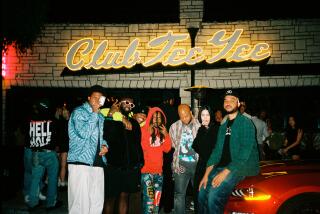Cowboy Kudos
- Share via
Roy Rogers will be there, his health permitting, and Dale Evans, no matter what.
Neither wants to miss Gene Autry’s nonagenarian birthday bash Monday. After all, the three are old friends as well as charter members of the cowboy pantheon. It was Autry who gave Rogers (now 85) his big break, his first movie role, back in 1935, in “Tumbling Tumbleweeds.”
Country and western star Willie Nelson will perform at the gala, to be held in a giant tent on the grounds of the Autry Museum of Western Heritage, the increasingly prestigious museum that Autry built in Griffith Park. Singing legend Rosemary Clooney will also perform for Autry, with Dick Clark serving as emcee. Actor Clint Eastwood is among those who have yet to indicate whether they will attend.
Autry was born 90 years ago Monday in Tioga, Texas. First famous as a singing cowboy, on radio and later in the movies, Autry has a record five stars on the Hollywood Walk of Fame, including one for his rodeo and other theatrical performances. Active in show business from his radio debut in 1928, he made 94 feature films and 635 recordings, many of songs he wrote or co-wrote.
His recording of “That Silver-Haired Daddy of Mine” (which he co-wrote) sold more than a million copies, to become the first gold record ever. His “Rudolph, the Red-Nosed Reindeer” is the second best-selling single of all time.
Once a major box-office draw (in 1940, only Mickey Rooney, Spencer Tracy and Clark Gable were deemed more popular in a trade-journal poll), Autry was also the first major movie star to work in television, beginning in 1950.
Then, of course, there was the California Angels baseball team.
What Autry hasn’t always received is the respect of critics and scholars. But, as the singing cowboy looks at 90, there is Autry revisionism afoot. Maybe Gene wasn’t the most charismatic actor who ever lived, but there are a number of serious scholars who think his impact on popular culture was enormous and has gone unrecognized far too long.
Jack Nachbar is professor emeritus of popular culture at Ohio’s Bowling Green State University. He points to Autry’s major impact in two areas--music and movies.
“He expanded the market for country music by singing it for people who didn’t listen to the Grand Old Opry,” says Nachbar.
He also credits Autry with creating a new kind of western. According to Nachbar, the West of Gene Autry movies wasn’t the historical West. It was its own kind of fantasy world (as in the Autry serial, “Phantom Empire”) or it was the contemporary West, which explains why radios, trucks and cars pop up in Autry productions as often as Joshua trees.
Focusing on Autry’s work of the 1930s and 1940s, Nachbar says, “During a time of turbulent questioning of values, Gene’s old-fashioned agrarian values would triumph over more decadent urban values: The country hero would beat the city slickers.”
Nachbar grew up in the 1940s and remembers Autry’s movies and those of Rogers with great affection. Autry “was immensely popular until he went into the service [in 1942],” Nachbar recalls. “When he came back, Roy Rogers had sort of taken the mantle.”
English scholar Peter Stanfield is an outright apologist for Autry. Currently writing a doctoral dissertation on the Hollywood westerns of the 1930s, Stanfield believes Autry has never received his critical due and has been unfairly denigrated by critics who don’t understand his populist appeal.
“As a figure for the 1930s, I think he should be up there with Jean Harlow, Clark Gable and all those other icons of the time,” Stanfield says. The scholar, a senior lecturer at the Southampton Institute, thinks Autry has been neglected, even dissed, by cultural historians who fail to appreciate the extent to which Autry spoke to working-class concerns.
“He spoke to the lower classes, those who didn’t have much,” Stanfield says. “He spoke very much to those who felt cut off from the promises the republic had made to them.”
Autry appealed to adults and children, men and women, “all basically working class,” in Stanfield’s view. Characters who had lost their land or who had little money or clout were invariably treated with respect in Autry’s work, the scholar says. “He was on their side, always.”
Stanfield notes that Autry was as popular in Great Britain as he was in the United States. He drew massive crowds during a visit to England in 1939, when he rode Champion into the Ritz Hotel.
“There was pandemonium,” Stanfield says. “It was like Beatlemania for the 1930s, only around Gene Autry.”
Stanfield, who hopes to publish his dissertation in book form, would like to see Autry take his rightful place, along with John Wayne and others, “back in the heart of the history of the West, rather than at the edges.”
Kevin Mulroy, the English-born scholar who heads the Autry museum’s research center, says that even academics are a little awe-struck when they meet the singing cowboy in the flesh.
“Whenever I get anybody here and they see Gene, it’s really as if they are looking at an icon. They say, ‘God, he’s the last of them--John Wayne, Jimmy Stewart. . . . Who’s left?’ ”
BE THERE
Gala--Don Edwards and other performers will present birthday concerts honoring Gene Autry at 2 and 4 p.m. Sunday in the Autry museum’s Wells Fargo Theater, 4700 Western Heritage Way, Los Angeles. $15. (213) 667-2000, Ext. 317. A few tickets are available for the Monday gala, which starts with a silent auction at 5:30 p.m.; $500 per person. (213) 667-2000, Ext. 301.
More to Read
The biggest entertainment stories
Get our big stories about Hollywood, film, television, music, arts, culture and more right in your inbox as soon as they publish.
You may occasionally receive promotional content from the Los Angeles Times.










